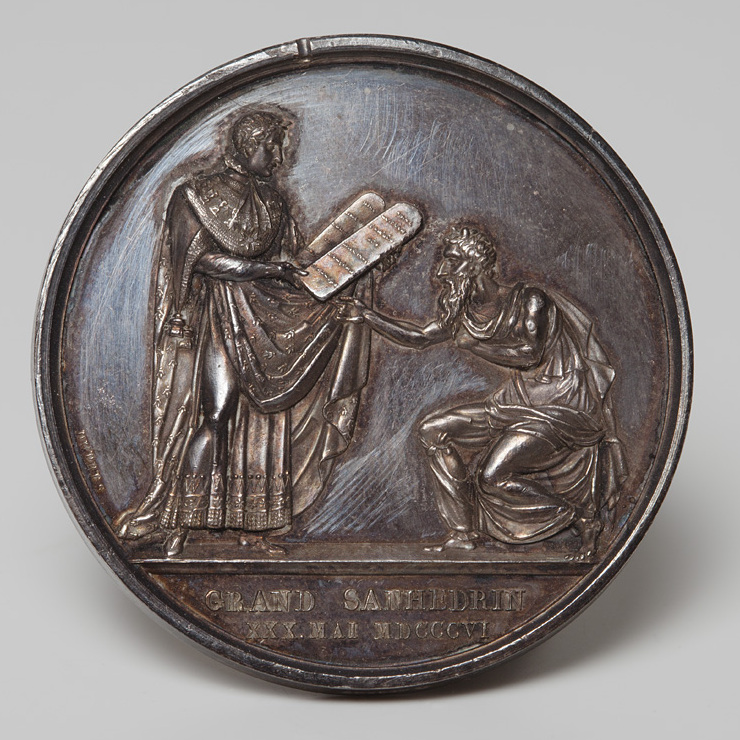|
Rabbinical Conference Of Brunswick
The Rabbinical Conference of Brunswick was a conference held in 1844 in Brunswick, convoked by Levi Herzfeld and Ludwig Philippson. Other attendees included Solomon Formstecher, Samuel Hirsch, Mendel Hess, Samuel Holdheim. Although he did not attend due to impending death, following the conference Áron Chorin, on his death-bed, wrote a declaration of his support of its conclusions. The following summer a synod at Frankfort-on-the-Main heard reports commissioned by the Brunswick session that dealt with various liturgical, practical, and theological topics. At this 1845 synod rabbis attending it declared that women count in a minyan, a formalization of a customary Reform practice dating back to 1811. Responding to the various complaints raised over the centuries against the Kol Nidre, the 1844 rabbinical conference decided unanimously that the formula was not essential, and that the members of the convention should exert their influence toward securing its abolition, before the fo ... [...More Info...] [...Related Items...] OR: [Wikipedia] [Google] [Baidu] |
Braunschweig
Braunschweig () or Brunswick ( , from Low German ''Brunswiek'' , Braunschweig dialect: ''Bronswiek'') is a city in Lower Saxony, Germany, north of the Harz Mountains at the farthest navigable point of the river Oker, which connects it to the North Sea via the rivers Aller and Weser. In 2016, it had a population of 250,704. A powerful and influential centre of commerce in medieval Germany, Brunswick was a member of the Hanseatic League from the 13th until the 17th century. It was the capital city of three successive states: the Principality of Brunswick-Wolfenbüttel (1269–1432, 1754–1807, and 1813–1814), the Duchy of Brunswick (1814–1918), and the Free State of Brunswick (1918–1946). Today, Brunswick is the second-largest city in Lower Saxony and a major centre of scientific research and development. History Foundation and early history The date and circumstances of the town's foundation are unknown. Tradition maintains that Brunswick was created through the merge ... [...More Info...] [...Related Items...] OR: [Wikipedia] [Google] [Baidu] |
Grand Sanhedrin
The Grand Sanhedrin was a Jewish high court convened in Europe by Napoleon to give legal sanction to the principles expressed by an assembly of Jewish notables in answer to the twelve questions submitted to it by the government.Jew. Encyc. v. 468, s.v. France The name was chosen to imply that the Grand Sanhedrin had the authority of the original Sanhedrin that had been the main legislative and judicial body of the Jewish people in classical antiquity and late antiquity. Assembly of Notables An assembly of Jewish notables was summoned in April 1806 by the Emperor to consider a set of 12 questions. Those who attended were largely from the Bordeaux or Rhine regions (Alsace and Lorraine). They were led by Rabbi David Sinzheim of Strasbourg, who later became the chairman ("nasi") of the Grand Sanhedrin. The questions presented were: # Is it lawful for Jews to have more than one wife? # Is divorce allowed by the Jewish religion? Is divorce valid, although pronounced not by courts of ... [...More Info...] [...Related Items...] OR: [Wikipedia] [Google] [Baidu] |
1844 In Germany
Events in the year 1844 in Germany. Incumbents * King of Bavaria – Ludwig I of Bavaria * King of Hanover – Ernest Augustus * King of Prussia – Frederick William IV * King of Saxony – Frederick Augustus II * King of Württemberg – William I of Württemberg * Grand Duke of Baden – Leopold, Grand Duke of Baden Events * 15 March – opening of Gößnitz station Undated * Rabbinical Conference of Brunswick Establishments * Freiburger Turnerschaft von 1844 * Roemer- und Pelizaeus-Museum Hildesheim * Waggonfabrik Fuchs Births * 3 January – Hermann Eggert, German architect (died 1920 Events January * January 1 ** Polish–Soviet War in 1920: The Russian Red Army increases its troops along the Polish border from 4 divisions to 20. ** Kauniainen, completely surrounded by the city of Espoo, secedes from Espoo as its own ma ...) * 16 January – Paul Singer (politician), Paul Singer, German politician (died 1911 in Germany, 1911) * 14 February – Joseph Thyss ... [...More Info...] [...Related Items...] OR: [Wikipedia] [Google] [Baidu] |
Religion In Braunschweig
Religion is usually defined as a social-cultural system of designated behaviors and practices, morals, beliefs, worldviews, texts, sanctified places, prophecies, ethics, or organizations, that generally relates humanity to supernatural, transcendental, and spiritual elements; however, there is no scholarly consensus over what precisely constitutes a religion. Different religions may or may not contain various elements ranging from the divine, sacred things, faith,Tillich, P. (1957) ''Dynamics of faith''. Harper Perennial; (p. 1). a supernatural being or supernatural beings or "some sort of ultimacy and transcendence that will provide norms and power for the rest of life". Religious practices may include rituals, sermons, commemoration or veneration (of deities or saints), sacrifices, festivals, feasts, trances, initiations, funerary services, matrimonial services, meditation, prayer, music, art, dance, public service, or other aspects of human culture. Religions have sa ... [...More Info...] [...Related Items...] OR: [Wikipedia] [Google] [Baidu] |


